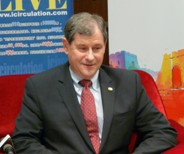我很荣幸能代表美国心脏病协会来参加长城会。非常幸运的是这次大会是美国非传染性疾病峰会结束后的第一个重要心脏病会议,在美国非传染性疾病峰会上已经做出了官方声明,宣布非传染性疾病已经是全世界巨大的负担和急待解决的问题。
 AHA Chairman, Gordon Tomasselli: It is an honor to represent the American Heart Association at the Great Wall Meeting. It is auspicious that this is the first major cardiology meeting since the United Nations non-communicable diseases summit, where the declaration was officially announced that non-communicable diseases is a problem of enormous burden and enormous urgency throughout the world. The guidelines that were put forth at the UN are guidelines that we all need to take to heart and try to reinforce in our own countries. I hope that we will be able to continue this conversation at the AHA meeting next month in November in Orlando, Florida where our international congress will be on the global prevention of heart disease and stroke, and will coincide with several new guidelines statements including JNC-8, the guidelines statement for blood pressure, the guideline statement for cholesterol treatment ATP-4, and OBESITY-2, the national guidelines for the management of patients who are obese.
AHA Chairman, Gordon Tomasselli: It is an honor to represent the American Heart Association at the Great Wall Meeting. It is auspicious that this is the first major cardiology meeting since the United Nations non-communicable diseases summit, where the declaration was officially announced that non-communicable diseases is a problem of enormous burden and enormous urgency throughout the world. The guidelines that were put forth at the UN are guidelines that we all need to take to heart and try to reinforce in our own countries. I hope that we will be able to continue this conversation at the AHA meeting next month in November in Orlando, Florida where our international congress will be on the global prevention of heart disease and stroke, and will coincide with several new guidelines statements including JNC-8, the guidelines statement for blood pressure, the guideline statement for cholesterol treatment ATP-4, and OBESITY-2, the national guidelines for the management of patients who are obese.
Clearly this is a big problem throughout the world. In the Americas non-communicable diseases kill three quarters of our population, those who die die from non-communicable diseases. We have over 200 million people who have non-communicable diseases, while 26% of Americans are obese, and it is estimated that 5% of the United States’ GDP is spent on non-communicable disease management. Again, this is an enormous problem that is included explicitly in the AHA heart management goals for 2020, which is to improve cardiovascular health by 20% while reducing mortality from stroke and heart disease by 20% by the year 2020. We have the perspective that this is a large and urgent problem affecting all countries throughout the world. The risk factors appear to be common risk factors, although they may be weighted different in different places. These risk factors include, tobacco use, lack of physical activity, body weight, too high of a blood pressure, too high blood sugar, and too high blood cholesterol. These are all things that we as a global population need to work on. The United States government Department of Health and Human Services has also recognized the urgency of this problem, recently announcing the ‘Millions Hearts Initiative’, an initiative to coordinate government organizations and industry partners to reduce by one million the number of cardiovascular related deaths.
AHA主席,Gordon Tomasselli教授:我很荣幸能代表美国心脏病协会来参加长城会。非常幸运的是这次大会是美国非传染性疾病峰会结束后的第一个重要心脏病会议,在美国非传染性疾病峰会上已经做出了官方声明,宣布非传染性疾病已经是全世界巨大的负担和急待解决的问题。联合国提出的指南是我们都需要铭记于心并尽力在我们自己的国家实践的指南。我希望我们能在下个月也即11月在福罗里达州奥兰多举行AHA会议上继续这个话题,在即将到来的AHA国际会议上我们将讨论在全球进行心脏病和中风的预防,并且会发布一些新的指南,包括高血压的指南声明JNC-8、胆固醇治疗的指南声明ATP-4以及治疗肥胖患者的全国性指南OBESITY-2。
很明显非传染性疾病已经成了全世界最大的问题。在美国非传染性疾病导致的死亡率占总死亡率的3/4,。我们有超过20千万的非传染性疾病患者,并且26%的美国人有肥胖,据估计美国每年需要花费5%的GDP用来治疗非传染性疾病。而且这是AHA心脏病2020年治疗目标中明确包括的重大问题。我们预见这是影响全世界所有国家的巨大和紧急的问题。非传染性疾病的危险因素似乎都是普遍共同的危险因素,尽管这些危险因素所占的重要地位在不同的地方有所不同。这些危险因素包括,吸烟、缺乏体育运动、体重超重、血压水平太高、血糖高以及胆固醇水平太高。这些因素都是我们全球的人类需要共同解决的问题。美国政府的健康和公共事业部门也同样认识到了解决这个问题的紧迫性,最近已经宣布了“百万心脏倡议”,倡议政府组织和工业合作者共同协作来减少一百万心脏病导致的死亡。



 京公网安备 11010502033353号
京公网安备 11010502033353号